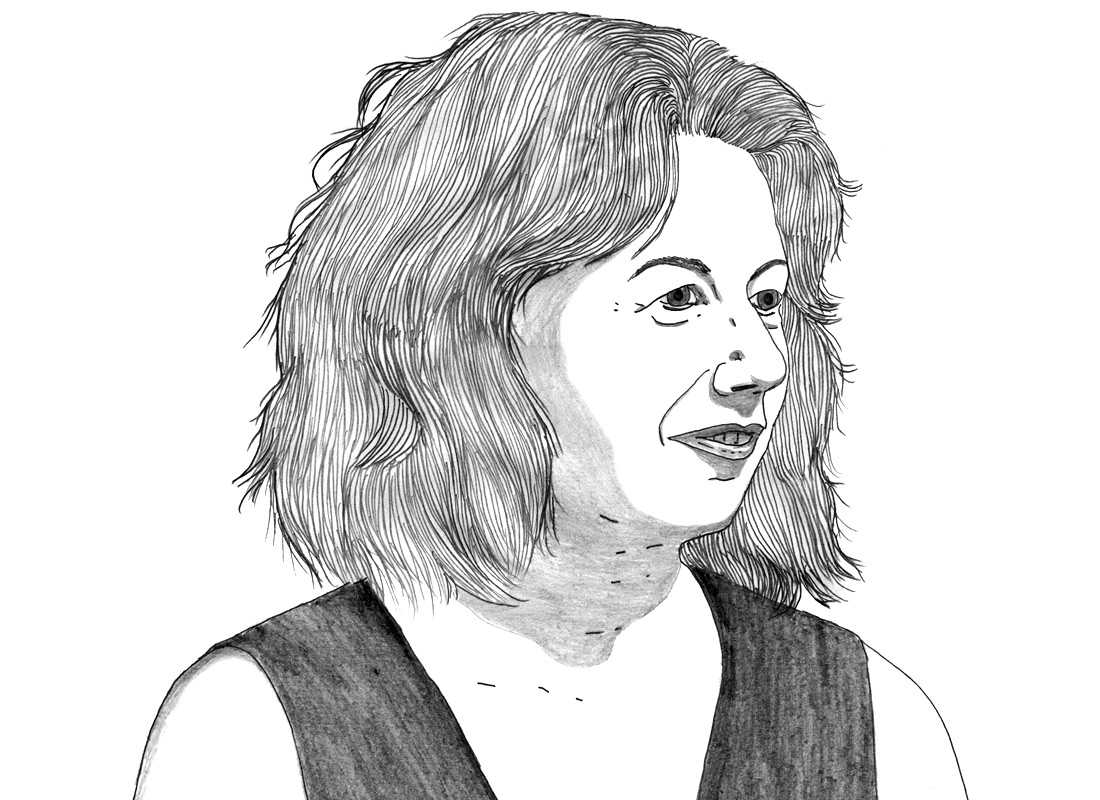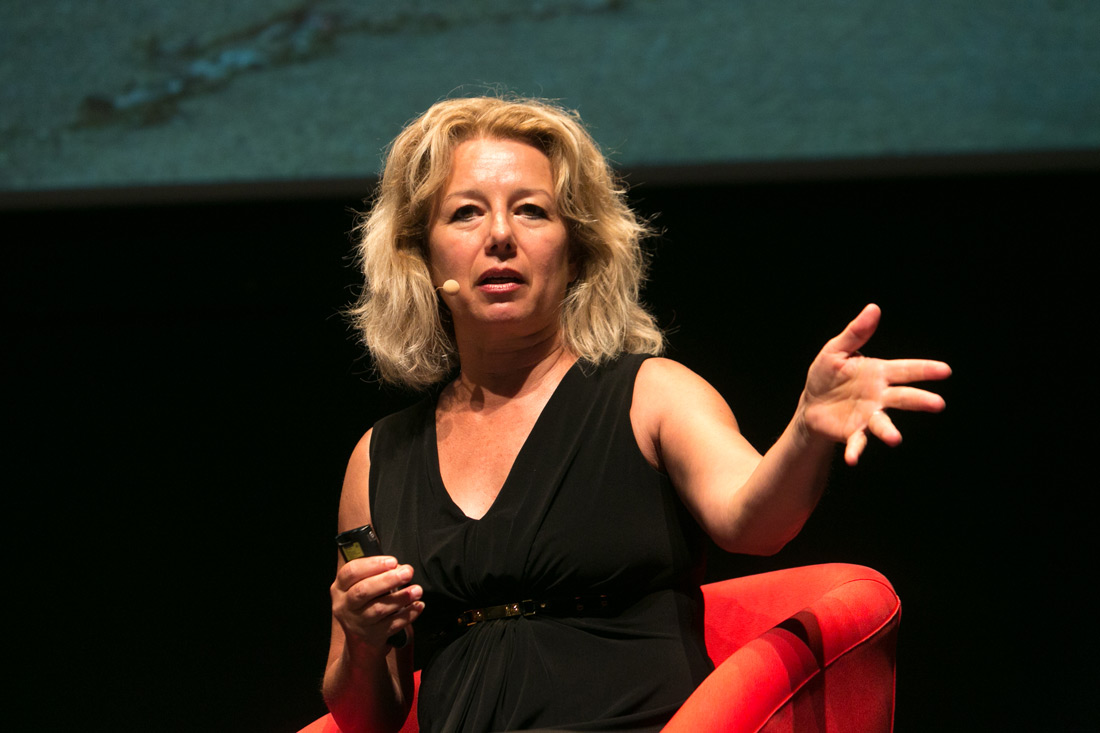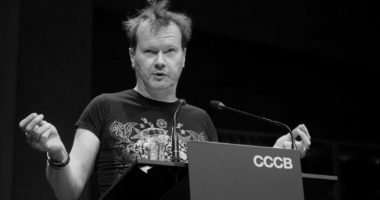
Laura Faye Tenenbaum | Illustration by José Antonio Soria | CC-BY
Laura F. Tenenbaum is a scientist who confesses herself totally in love with planet Earth, with “small little nothings”. In front of her, there is no way to talk about migrating to distant exoplanets, as astrophysicist Stephen Hawking suggests. Tenenbaum explains to the general public the science of our planet and of climate change and its effects. And she does it through emotion. Her goal is to engage people from an optimistic and dynamic point of view. Tenenbaum was a member of the Earth Science Communications Team at NASA’s Jet Propulsion Laboratory, where she created content for the climate website Global Climate Change: Vital Signs of the Planet and the Earth Right Now blog. This year, Tenenbaum has been a jury member in the second Cultural Innovation International Prize launched by the CCCB, which had climate change as its theme.
“¡Hola! ¡Buenas tardes a todos!”. Self-confidenced, with a great sense of humour and with amazing pictures from Greenland she took earlier this year, Laura F. Tenenbaum, an innovator in Science Communication from NASA, blew away the audience at the CCCB the day the Cultural Innovation International Prize was announced. From the very beginning of her talk. As she usually does when she speaks at schools, universities, museums or even TED talks. And, in particular, in her writing.
There are two kinds of people: on the one hand, those who selfishly choose to completely ignore reality, thinking, “La la la! It’s all about me”. And then there is a group of people panicking. Absolutely panicking. I don’t really see either of the two —the ignorant and the freaked out— as useful ways to live. We have to stay calm and we have to stay positive. Indeed, we are all contributing to climate change. Are we?
If something should happen to me medically, I would choose to go to the hospital and they have single-use plastic. Hospitals are very un-environmental, but I would go, I would use modern medicine. And we are now, while making this interview, drinking water from plastic bottles. To be alive means you are using something. There is no absolute selflessness. People can do their best, but ultimately, society has to make bigger changes. As a group, we need to move forward with better laws, better government and all that to change. For instance, renewable energy makes much more sense economically, so we are already moving forward.
Not in Spain, where renewable energy is more taxed than fossil fuel energy.
The old guard, no matter what it is, is going to fight and hold on, of course. But there are so many things that are already happening: the really big companies in America — Google, Facebook, huge companies— are already 100% renewable. States will make the commitment; they are pushing it. And other countries will too. So ultimately, it’s going to happen.
If we all go green, can we expect to stop the effects of climate change?
One of the things that happens in California, and I’m guessing it might happen here as well since our climate is so similar, is that we have a big drought. People like to say the drought is from climate change, but that’s complicated, because —and tell me if it’s true here— the drought is also a result of humans wasting water. A lot of people are moving to California, a lot of people are using more water; there are big golf courses, big grassy lawn. So it does confuse the science when you say the drought is 100% climate change. But if you look at something like ice melting in Greenland, that’s climate change. And when the ice melts, it causes sea-level rising. Due to that Venice is sinking, and Florida in America is sinking, and Bangladesh is sinking. Some areas are really in trouble. Even Lower Manhattan, which is super expensive.
But even if we stopped using fossil fuels today and not a single person burned a single fossil fuel ever again, we are locked into sea-level rise for a couple of reasons. Water holds heat and we have already heated up earth’s ocean. It’s going to hold that heat, and hot things expand. So we are locked into sea-level rise, regardless.
Best-case scenario: we’re still getting sea-level rise. We’re going to lose, perhaps, Tuvalu, the Maldives and Bangladesh, where there are already climate refugees. In Florida there is already flooding. Science predicts that we are going to see bigger storms, extreme events. Do you want to know the science behind that?
Please.
Earth is amazing. One of the best things about planet Earth is the water. Water is stabilising. So mostly, planet Earth has a really, really stable climate. In the past, the climate has changed. For example, one of the things that caused a huge flux in climate in the past was that North America and South America they didn’t always close. The isthmus at one point, around 60 million years ago, closed them and changed the ocean currents severely. So there was fluctuation and then it got stable.
What is happening now is these fluctuations, these extreme events: bigger storms, floods, droughts, etcetera. And that’s the Earth trying to figure out what is the new normal as it goes through this flux. Eventually, in hundreds or thousands of years, it will find a new stable, a new normal. But we’re locked in for a thousand years, because the ocean is slow.
Stephen Hawking says that we need to urgently find another planet, because this one is going to be…
I totally disagree! That’s such a dude thing to say… (this is me being sexist). I work at NASA, where there are obviously a lot of people who want to move to another planet. I say, “No!”. I am not a fan of pooping on the place that you love and finding another place. No, no, no. For sure. I also think that whole idea of having to go to another planet seems so macho explorer.
You work in communication. How do we communicate something that has been communicated for so long in a new way that can make people aware of the problem without being tabloid-like?
I don’t think there is a one-size-fits-all way of communication. For me it is through emotions. Sometimes a sense of humour too!

Laura Faye Tenenbaum | © CCCB, 2017. Author: Miquel Taverna
Can you give an example?
Most of the time I am inspired by a small little nothing. I was recently up in Greenland and I turned around —the story’s about turning around. I was very high north, about 85º north latitude, and the sun never gets very high in the sky there, it is always low. So I turned around and the sun hit the ice and came into my eyes. All of a sudden, I understood the albedo effect in a whole different way. The “albedo effect” is that white things are more reflective than dark things, so that’s why in a hot place people tend to wear white colours and it’s also why you wouldn’t want to walk outside with your bare foot and step on black concrete.
In Greenland it’s really important because the white ice reflects the sun and when the ice melts you get the blue ocean, which is really, really dark. So I understood the science but, still, I was up there, and it was the end of April, so it was a 14-hour day. The sun stayed up a long time, with sunset at around 9.30. So I was asking, “Why is the ice not starting to melt?”. And I basically told the story of what it felt like to just, in that one moment, turn and let the ice reflect into my eyes and what that felt like, that stark standing-there feeling. I just described it.
Do you get feedback from the audience?
I do. You have to listen to the audience.
But how?
Well, you can sense it. Sometimes I’ll just sit at my desk and I will sense, what’s the vibe? What do I feel? And the first two or three paragraphs will just be some random writing about what’s going on, what are my feelings right now, what’s the energy of the space that I am in, because I’m not that different than everyone else. It’s like we all have this collective mood. I’ll throw those first three paragraphs away and start there. Often times, my pieces start with those sentences about you —you may be feeling this — and try to build a relationship with an audience, to sense them remotely if they are not in the room.
One thing I noticed from just going out and talking to young people is that they are really interested in video, they are really interested in humour. They want something engaging. So I try to. Is there a way to make your communication about climate change engaging? Also the science has to be accurate, it has to be. Or else, you are doing a disservice.
Which has been your most read and commented piece of work?
The most commented piece that I ever wrote was something about the solution. People are always asking about solutions and I say there are three things you can do: you can take responsibility for everything you can. Obviously, one person can’t save the world, but you can do something, everybody can.
You can join together with others —and that’s huge. That includes voting with your dollar or your euro, or voting, joining Green Clubs and environmental clubs everywhere, and there is power in numbers. We need it! We are so much more powerful when we are together in groups, because one person cannot possibly have all the answers. I am going to learn from you and you are going to learn from me. Plus, we all make a commitment to make choices and we can all move together. I think it empowers people.
And then the last thing is taking a moment every day to build a relationship with nature. I think, in the end, the reason why people over-consume is there is this emptiness, perhaps loneliness. When we connect with nature and really build a relationship with something in nature, not only do we fill up that emptiness, but we are also less likely to want to do things to hurt the environment. Connecting with nature is something that’s important to do every day.
It’s quite difficult if you live in a city, isn’t it?
There is a weed crawling from a crack in the sidewalk!
No need to go to a national park, then.
You can! I go to the Rocky Mountain National Park about three times a year, but you have to do something every day. You have to find a way to connect with nature every day.




Leave a comment